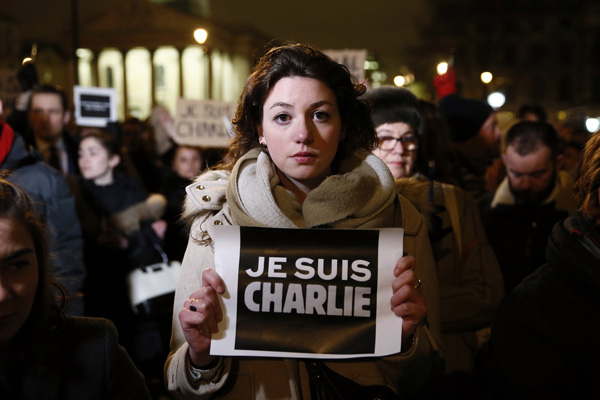 |
|
A woman holds a placard that reads, "I am Charlie", during a vigil to pay tribute to the victims of a shooting by gunmen at the offices of weekly satirical magazine Charlie Hebdo in Paris, at Trafalgar Square in London on January 7, 2015. [Photo/Agencies] |
The terrorist attack on the offices of Charlie Hebdo deserve universal condemnation. But the tragedy has also brought into focus the debate between our cherished Western value of freedom of expression and the fuzzy border where free speech ends.
In such matters the United States' view is much more liberal than in France or in the European Union as a whole. The very first change to the US Constitution, the Bill of Rights, adopted in December 1791, not coincidentally around the same time as the French Revolution and its aftermath, prohibits any law limiting freedom of speech. Of course, there are some limitations for matters such as national security, child pornography and inciting violence.
The latest relevant ruling by the US Supreme Court, in a 1969(Brandenburg vs Ohio) case involving the white supremacist organization Ku Klux Klan, held that the government is prohibited from punishing inflammatory speech unless it is aimed at inciting, and is likely to incite, imminent lawless action. Under this ruling for example, Nazis in the US have been able to operate freely organizing marches and public demonstrations.
By contrast, in post-World War II Europe, in reaction to the horrors of Nazism and spurred on by xenophobic anti-Semitic propaganda, many countries adopted hate speech laws designed to prohibit inciting religious and racial hatred. It's ironic that France was several generations ahead of the curve in that its Press Law of 1881 criminalizes incitement to racial discrimination, hatred or violence on the basis of membership of an ethnic, racial or religious group.
The legal bar in France is set high, however. Charlie Hebdo has been unsuccessfully sued several times in lawsuits claiming that it was variously anti-Semitic and anti-Muslim. Its cartoons, as we've seen these last few days have lampooned main stream religions of all stripes but the Muslims perhaps more so and more viciously.
This debate would be incomplete if we did not consider the views of Muslims, a few of whom have resorted to the extreme violence that we have seen in Paris this week or perpetrated by Islamic State group in Iraq and Syria in recent months. A London-based radical Muslim preacher, Anjem Choudary, said on Wednesday that he blamed freedom, and freedom of expression for the Charlie Hebdo attack.
Freedom of speech can involve opinions to which others vehemently disagree. It can be hurtful, insulting, offensive, anger-inducing and demeaning. But in the West we fervently believe in the clash of opinions, viewpoints and arguments in the marketplace of ideas.
But freedom of speech in the US and the EU is not absolute. Pens, pencils and word processors are versatile instruments. There are many other ways to make a point-and to make it even more sharply. A picture or a cartoon may be worth a thousand words. In the right hands those words can move people much more profoundly. But in the wrong hands, and for the wrong pairs of eyes, well, they can mean a totally different thing.
The author is a senior adviser to Tsinghua University and former director and vice-president of ABC Television in New York.

I’ve lived in China for quite a considerable time including my graduate school years, travelled and worked in a few cities and still choose my destination taking into consideration the density of smog or PM2.5 particulate matter in the region.